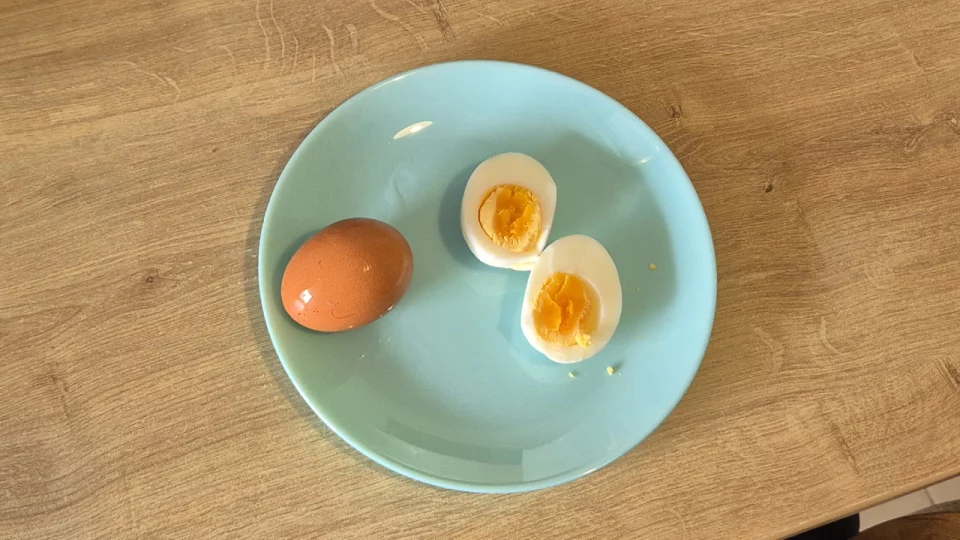Hard boiled eggs are a simple yet versatile food that can be enjoyed on their own, added to salads, or used in various recipes. While boiling an egg might seem straightforward, achieving the perfect hard boiled egg, one that is easy to peel, with a creamy yolk and firm whites, requires a bit of technique.
Table of Contents
Step-by-Step GUIDE to help you Master the Art of Making Hard Boiled Eggs
Step 1: Choose the Right Eggs
For the best results, it’s often recommended to use eggs that are not too fresh. Fresh eggs can be harder to peel because their pH is lower, making the whites stick to the shell more. Eggs that are about a week old tend to peel more easily, so if you have the option, use slightly older eggs.
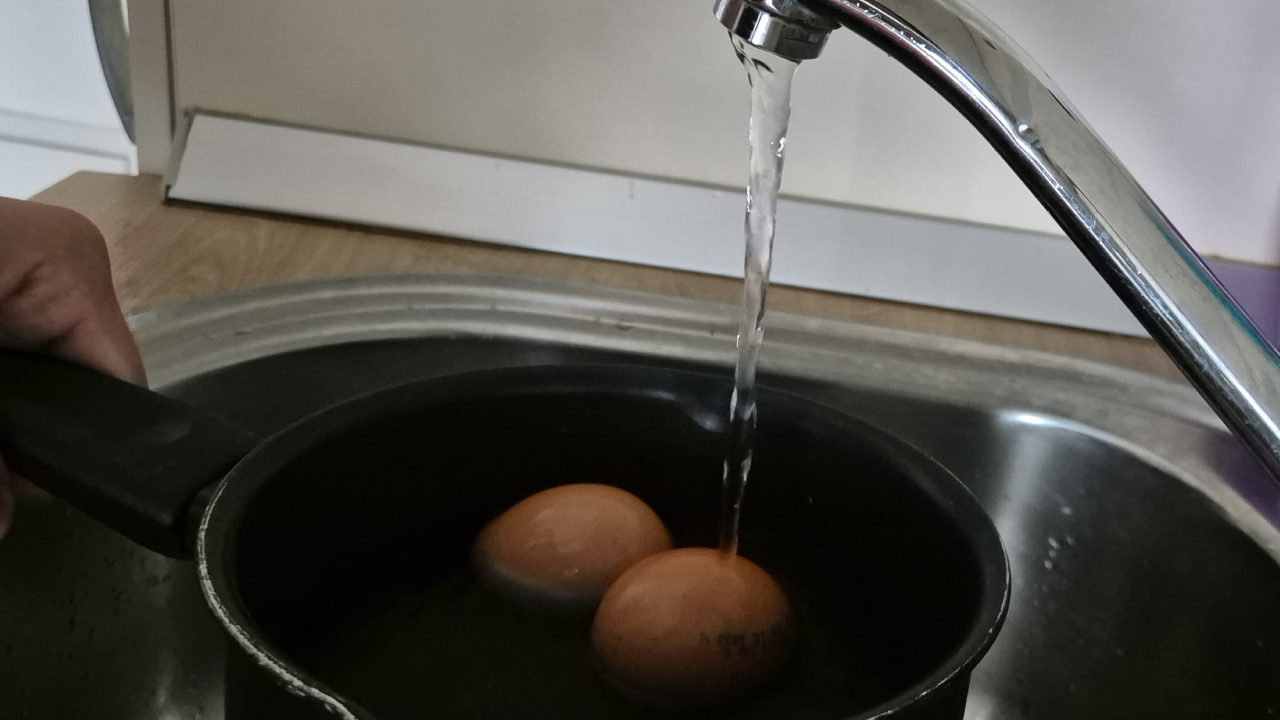
Step 2: Prepare the Pot
Select a pot that can comfortably hold your eggs in a single layer. Fill the pot with enough water to cover the eggs by about an inch or two. Adding too little water can result in uneven cooking, so make sure the eggs are fully submerged.
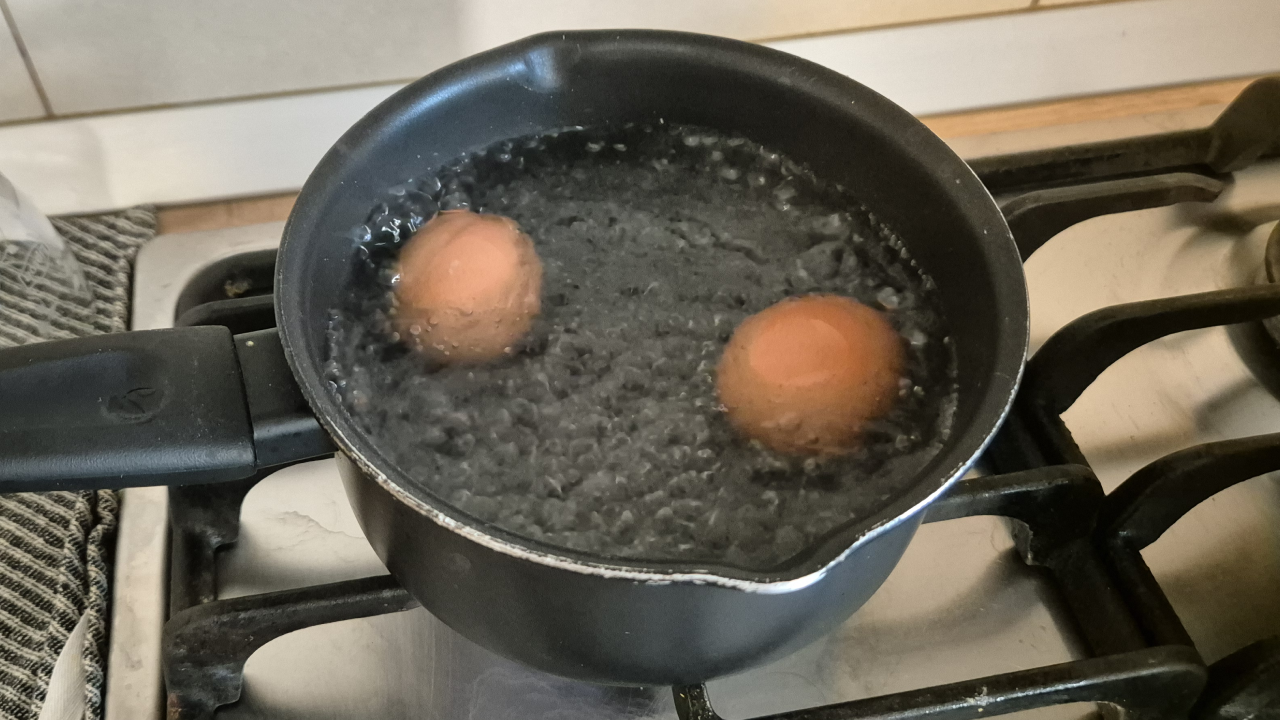
Step 3: Bring the Water to a Boil
Place the pot on the stove over medium-high heat. Allow the water to come to a full rolling boil. This step is crucial because starting the eggs in cold water and bringing it to a boil slowly can lead to uneven cooking.
Step 4: Boil, Then Simmer
Once the water reaches a boil, reduce the heat to low and let the eggs simmer. Depending on how you prefer your eggs, you can adjust the cooking time 🕛:
- Soft-Boiled Eggs: 4-6 minutes for a softer, slightly runny yolk.
- Medium-Boiled Eggs: 7-8 minutes for a firmer yolk that is still creamy.
- Hard Boiled Eggs: 9-12 minutes for fully set yolks.
For perfect hard boiled eggs with firm whites and fully cooked yolks, aim for 10-12 minutes.
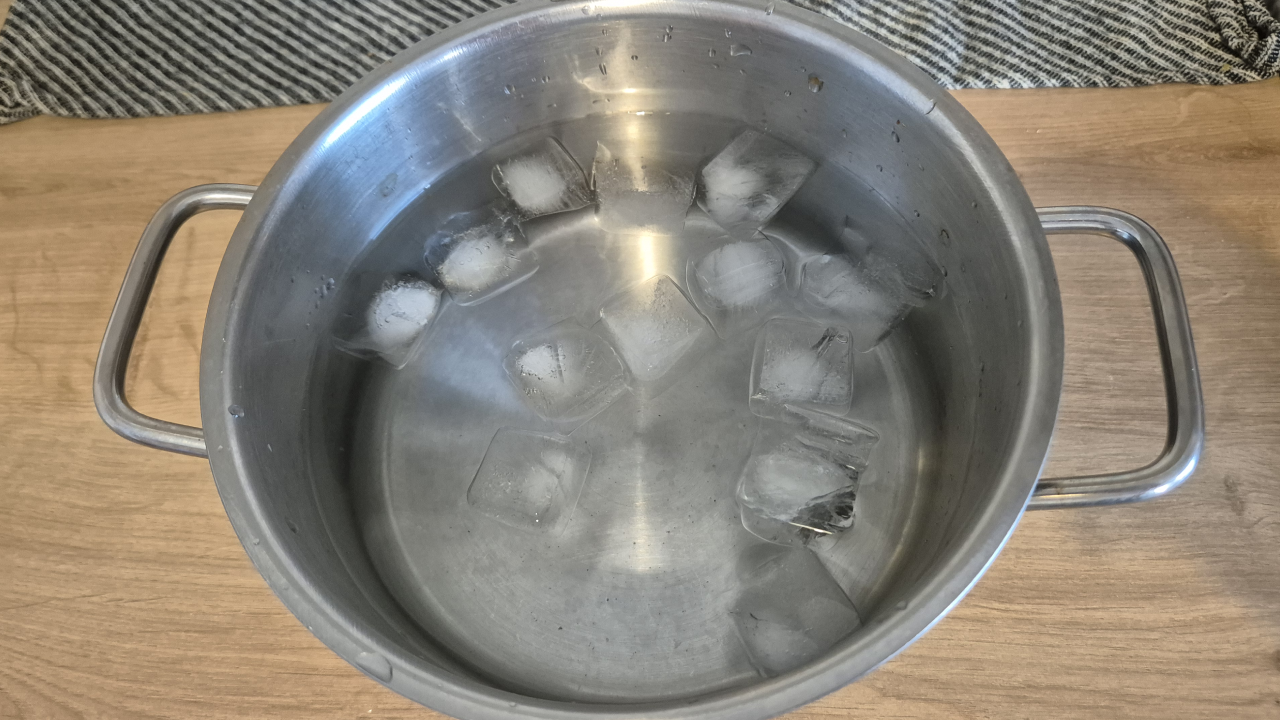
Step 5: Cool the Eggs
Once the eggs have finished cooking, promptly remove them from the hot water to stop the cooking process. The easiest way to do this is by transferring them to an ice bath – a bowl filled with ice water. Let the eggs cool in the ice bath for about 5-10 minutes. If you don’t have ice, you can also run cold water over the eggs for a few minutes. Cooling the eggs quickly not only stops the cooking process but also makes them easier to peel.
Step 6: Peel the Eggs
Peeling hard boiled eggs can sometimes be tricky, but cooling them thoroughly helps. Gently tap the egg on a hard surface to crack the shell, then start peeling from the wider end where the air pocket is. Running the egg under a bit of water while peeling can help remove any stubborn bits of shell.
Secrets for Hard Boiled Eggs Perfection
✅ Don’t skip Ice Bath for Hard Boiled Eggs
One crucial step that many people overlook is the ice bath. Skipping this step can make a significant difference in both the texture of the eggs and the ease of peeling. Here’s why the ice bath is essential when making hard boiled eggs.
Stops the Cooking Process
Once you’ve boiled your eggs to the desired level of doneness, the heat retained in the eggs continues to cook them even after they’re removed from the boiling water. This can lead to overcooked eggs with dry, crumbly yolks and a greenish-gray ring around them—a sign of excessive cooking. Placing the eggs in an ice bath immediately halts the cooking process by rapidly cooling them down. This helps to preserve the texture of both the yolk and the whites, ensuring your eggs are cooked just the way you want them.
Prevents Overcooking and Maintains Quality
Overcooked hard boiled eggs are not only visually unappealing, but they also suffer in taste and texture. The yolk can become dry, and the whites can turn rubbery. The ice bath prevents these issues by quickly lowering the temperature of the eggs. This step is particularly important if you’re boiling a large batch of eggs, as the residual heat from the surrounding eggs can cause overcooking if not cooled rapidly. By cooling them quickly, you lock in the ideal texture and prevent the unpleasant sulfuric smell often associated with overcooked eggs.
Makes Peeling Easier
Peeling hard boiled eggs can be a frustrating task, especially if the shell sticks to the egg white and results in a pitted, unattractive surface. The ice bath helps solve this problem by creating a small gap between the egg white and the shell. As the eggs cool rapidly, the egg whites contract slightly, making it easier to peel the shell away cleanly. This is particularly useful if you’re working with fresh eggs, which tend to be more difficult to peel due to their lower pH levels. Skipping the ice bath can leave you struggling with stubborn shells that refuse to come off easily.
Enhances Food Safety
Cooling eggs quickly after boiling is also important from a food safety perspective. When eggs are left to cool slowly at room temperature, they spend more time in the temperature “danger zone” (40°F – 140°F), where bacteria can multiply more rapidly. An ice bath brings the eggs down to a safe temperature quickly, minimizing the risk of bacterial growth and ensuring your eggs are safe to eat, especially if you plan to store them for later use.
Preserves Egg Integrity for Further Use
Whether you’re preparing hard boiled eggs for a salad, deviled eggs, or simply for snacking, you want the eggs to look and taste their best. The ice bath helps maintain the integrity of the eggs, ensuring they’re not overcooked or difficult to peel. This is especially important if presentation matters, such as when making deviled eggs or serving them whole. The ice bath ensures that your eggs are smooth, firm, and visually appealing.
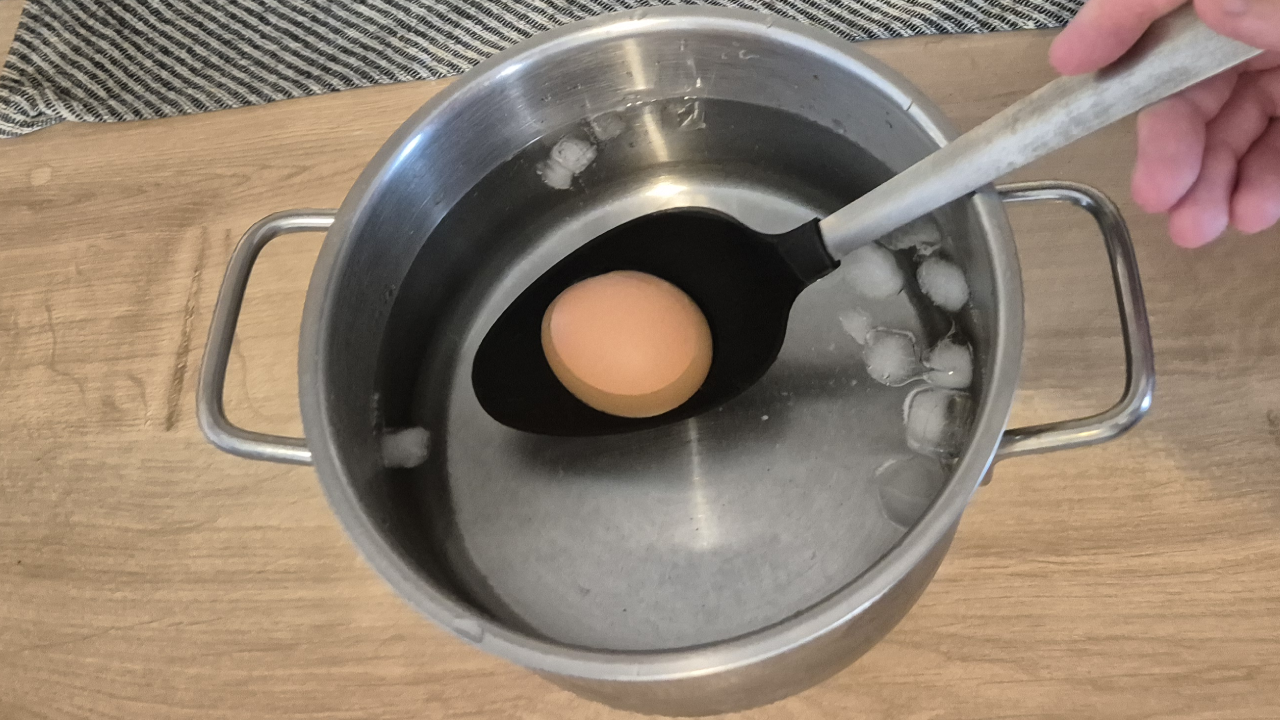
✅ Don’t use Fresh Eggs for Hard Boiled Eggs
While fresh eggs are often preferred for many culinary tasks, hard boiling is an exception. In fact, using slightly older eggs, rather than fresh ones, can be the key to achieving perfectly peeled hard boiled eggs.
Understanding the Science Behind It
The main reason why fresh eggs are not ideal for hard-boiling lies in the chemistry of the egg. Inside an egg, the pH level changes as it ages. Fresh eggs have a lower pH, meaning they are more acidic. This acidity causes the proteins in the egg whites to bond more tightly to the shell’s inner membrane during cooking. As a result, when you try to peel a fresh hard boiled egg, you may find that the shell clings stubbornly to the whites, leading to a messy peeling process and damaged eggs.
On the other hand, as eggs age, their pH level gradually increases, becoming less acidic. This increase in pH causes the egg whites to contract slightly and separate from the membrane, making it easier to peel the egg once it’s boiled. Therefore, eggs that are about a week old are generally considered ideal for hard-boiling because they strike a balance between freshness and ease of peeling.
Practical Benefits of Using Older Eggs
Using eggs that are not freshly laid for hard-boiling offers several practical advantages:
- Easier Peeling: As mentioned, older eggs have a higher pH, which allows the shell to come off more easily after boiling. This means you’ll spend less time struggling with stubborn shells and more time enjoying your perfectly smooth eggs.
- Better Presentation: When you can peel an egg cleanly, it maintains its smooth, round appearance. This is especially important if you’re using the eggs in recipes that require a polished look, such as deviled eggs or egg salads. No more unsightly pockmarks or chunks missing from the egg whites.
- Less Waste: Fresh eggs that are difficult to peel often result in wasted egg whites. With older eggs, you’re more likely to keep the egg intact, which means less food waste and more efficient use of your ingredients.
- Consistency: If you regularly hard-boil eggs, using slightly older eggs can give you more consistent results. You’ll be able to predict the outcome better and avoid the frustration of eggs that won’t peel properly.
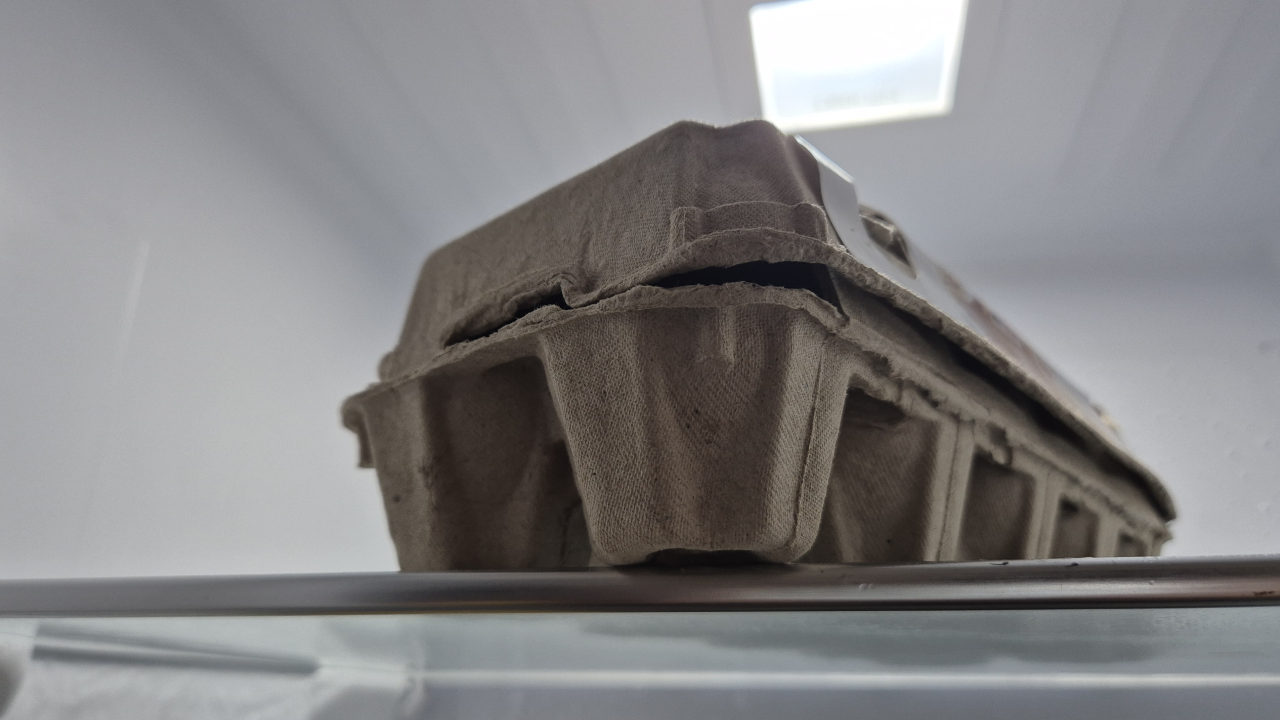
🥚Complete GUIDE of How To Store Eggs for Hard Boiling
Storing eggs properly before hard boiling them is key to achieving the perfect results. From maintaining freshness to ensuring easy peeling, the way you handle your eggs before cooking can make a big difference.
Understand Egg Freshness and Its Impact
Freshness plays a crucial role in the outcome of hard boiled eggs. Interestingly, slightly older eggs tend to peel more easily compared to very fresh ones. This is because, as eggs age, the pH of the white increases, which reduces its tendency to stick to the shell. If you plan to hard-boil eggs, consider using eggs that are at least a week old.
Proper Refrigeration
Eggs should always be stored in the refrigerator to maintain their freshness and prevent spoilage. Keep them in the original carton, which protects the eggs and helps maintain consistent moisture levels. The carton also prevents the eggs from absorbing strong odors from other foods in the refrigerator, which can affect their taste.
Store the eggs on a middle or lower shelf in the fridge, where the temperature is more stable, rather than in the door, where temperatures fluctuate more due to frequent opening and closing.
Storing Eggs for Long-Term Use
If you buy eggs in bulk or don’t plan to use them right away, make sure they are stored at a temperature between 33°F and 40°F (0.5°C to 4°C). This temperature range keeps the eggs fresh for longer. Eggs stored under these conditions can typically last for three to five weeks, giving you plenty of time to decide when to hard-boil them.
Check for Freshness Before Boiling
If your eggs have been stored for a while and you’re unsure about their freshness, there’s a simple test you can do. Place the egg in a bowl of water:
- Fresh eggs will sink to the bottom and lay flat on their sides.
- Slightly older eggs (ideal for hard-boiling) will stand upright on the bottom.
- Bad eggs will float to the top and should be discarded.
This water test can help you choose the best eggs for hard-boiling, ensuring that they are still good to eat and will peel easily.
Avoid Freezing Raw Eggs
While freezing can extend the shelf life of many foods, raw eggs in their shells do not freeze well. The liquid inside expands, which can cause the shell to crack, leading to a messy thaw and poor results when boiling. If you need to store eggs long-term, consider freezing the contents after cracking them into a container, but this is more appropriate for baking or scrambling rather than boiling.
Consider Room Temperature Before Boiling
Before boiling, it can be helpful to let your refrigerated eggs sit at room temperature for about 15-20 minutes. This can help prevent the shells from cracking due to the sudden temperature change when they hit the boiling water. However, don’t leave them out too long, as eggs are perishable and should not be left at room temperature for extended periods.
Store Boiled Eggs Properly After Cooking
Once you’ve boiled your eggs, proper storage is still essential. Hard boiled eggs should be stored in the refrigerator and consumed within a week. If you’re not planning to eat them immediately, keep them in their shells to protect them from absorbing odors and to prevent moisture loss.
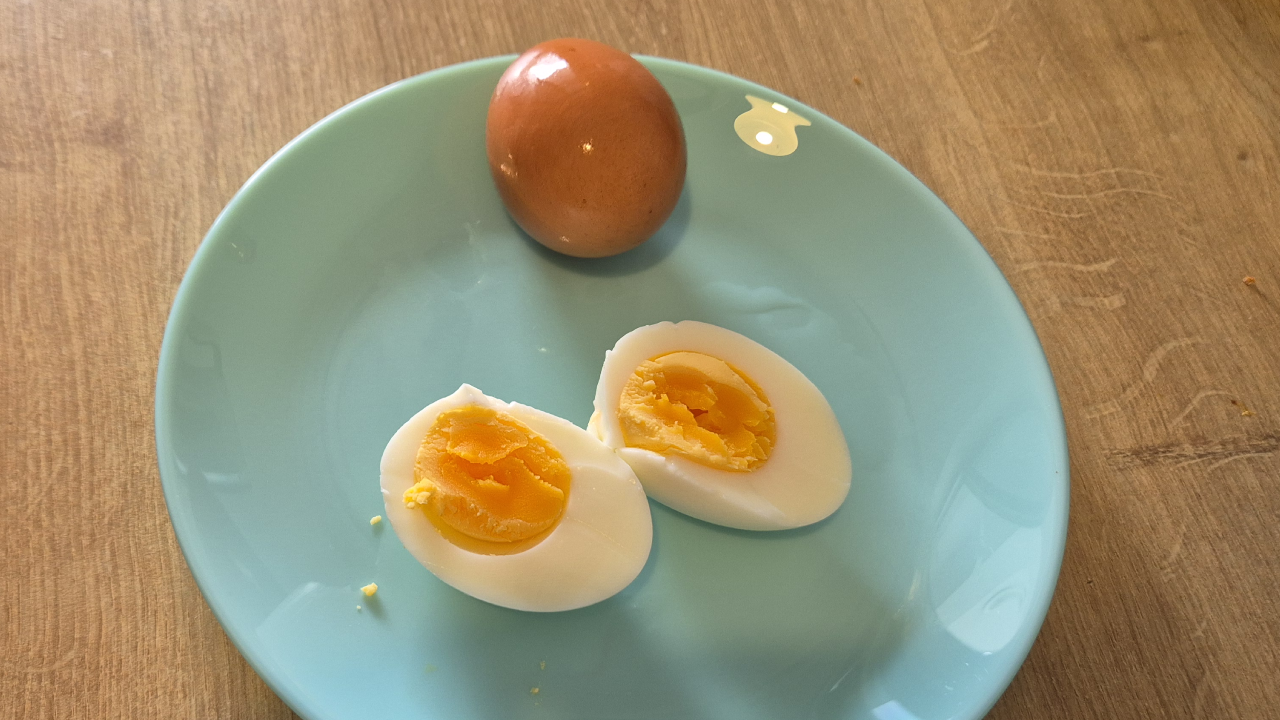
Creative Serving Suggestions for Hard Boiled Eggs
Hard boiled eggs are a classic, versatile ingredient that can be enjoyed on their own or used to elevate a variety of dishes. While they are often considered a simple snack or breakfast option, there are many creative ways to incorporate hard boiled eggs into your meals.
Here are some serving suggestions to make the most of your hard boiled eggs:
- Classic Deviled Eggs
Deviled eggs are a timeless favorite at parties and gatherings. To make them, slice your hard boiled eggs in half lengthwise, remove the yolks, and mash them with mayonnaise, mustard, a touch of vinegar, and your favorite seasonings. Spoon or pipe the yolk mixture back into the egg whites, and garnish with paprika, chives, or bacon bits for an extra pop of flavor. This elegant appetizer is sure to be a hit.
- Egg Salad Sandwich
For a quick and satisfying lunch, turn your hard boiled eggs into a creamy egg salad. Chop the eggs and mix them with mayonnaise, a dash of mustard, salt, pepper, and finely chopped celery or pickles for added crunch. Serve the egg salad on your favorite bread, croissant, or in a lettuce wrap for a lighter option. This classic sandwich is both comforting and filling.
- Salads with a Protein Boost
Hard boiled eggs are a fantastic way to add protein to salads. Slice or quarter the eggs and scatter them over a bed of greens, such as spinach or arugula. Pair them with other salad ingredients like avocado, cherry tomatoes, cucumbers, and a light vinaigrette dressing. A Cobb salad is a perfect example, featuring hard boiled eggs alongside bacon, blue cheese, and chicken for a hearty meal.
- Eggs on Toast
For a simple yet satisfying breakfast or snack, serve hard boiled eggs on toast. Mash the eggs with a little salt and pepper, then spread them on a slice of whole-grain toast. For extra flavor, add a layer of avocado or spread a thin layer of hummus or cream cheese on the toast before adding the eggs. This combination is both delicious and nutritious.
- Stuffed Eggs with a Twist
Beyond the classic deviled eggs, you can experiment with different stuffing ideas. Try mixing the yolks with ingredients like smoked salmon, capers, and dill for a seafood twist, or add some heat with sriracha and diced jalapeños. For a Mediterranean flavor, combine the yolks with feta cheese, olives, and sun-dried tomatoes. The possibilities are endless, and these creative variations will make your stuffed eggs stand out.
- Eggs in a Grain Bowl
Grain bowls are a popular, healthy meal option that can be customized to your taste. Start with a base of quinoa, brown rice, or farro, then add a variety of vegetables, such as roasted sweet potatoes, sautéed kale, and steamed broccoli. Top the bowl with sliced hard boiled eggs for a protein boost, and finish with a drizzle of tahini or a lemony dressing. This balanced meal is perfect for lunch or dinner.
- Scotch Eggs
For a more indulgent option, consider making Scotch eggs. These are hard boiled eggs wrapped in sausage meat, coated in breadcrumbs, and deep-fried or baked until golden brown. The crispy exterior contrasts beautifully with the soft egg inside, making it a delicious snack or appetizer. Serve with mustard or a dipping sauce for added flavor.
- Egg and Veggie Skewers
For a fun and visually appealing presentation, create skewers with hard boiled eggs and vegetables. Thread halved eggs onto skewers along with cherry tomatoes, cucumber slices, and bell pepper chunks. Drizzle with olive oil, sprinkle with herbs, and serve as a fresh and healthy appetizer or party snack.
- Ramen Topping
Hard boiled eggs make a fantastic addition to a steaming bowl of ramen. For a more authentic touch, marinate the eggs in soy sauce, mirin, and a bit of sugar for a few hours before serving. The eggs absorb the flavors of the marinade, and their creamy yolk adds richness to the broth. This simple addition can elevate your homemade ramen to restaurant quality.
- Eggs in a Pickle
For a tangy twist, consider pickling your hard boiled eggs. Submerge the peeled eggs in a mixture of vinegar, water, salt, and spices (like dill, garlic, and mustard seeds) and let them sit for a few days. Pickled eggs are not only a unique snack but also make a great addition to charcuterie boards or salads.
🔻Tips for Success:
- Add a Pinch of Salt or Vinegar: Some people add a pinch of salt or a splash of vinegar to the water, which can help prevent the eggs from cracking during boiling.
- Don’t Overcrowd the Pot: Make sure your eggs have enough space in the pot, allowing them to cook evenly.
- Peel Under Water: If you’re struggling with peeling, try peeling the egg under a bit of running water to loosen the shell.
